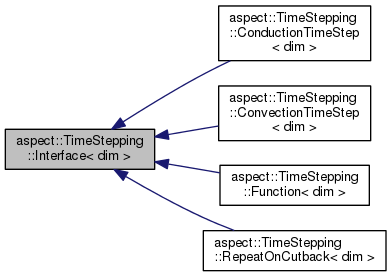 |
ASPECT
|
 |
ASPECT
|

Public Member Functions | |
| virtual double | execute ()=0 |
| virtual std::pair< Reaction, double > | determine_reaction (const TimeStepInfo &info) |
 Public Member Functions inherited from aspect::Plugins::InterfaceBase Public Member Functions inherited from aspect::Plugins::InterfaceBase | |
| virtual | ~InterfaceBase ()=default |
| virtual void | initialize () |
| virtual void | update () |
| virtual void | parse_parameters (ParameterHandler &prm) |
| virtual void | save (std::map< std::string, std::string > &status_strings) const |
| virtual void | load (const std::map< std::string, std::string > &status_strings) |
Additional Inherited Members | |
 Static Public Member Functions inherited from aspect::Plugins::InterfaceBase Static Public Member Functions inherited from aspect::Plugins::InterfaceBase | |
| static void | declare_parameters (ParameterHandler &prm) |
A base class for parameterizations of the time stepping models.
Definition at line 90 of file interface.h.
|
pure virtual |
Execute the logic of the plugin.
This is called after every time step to determine a) What to do (advance, repeat, etc.), see the Reaction enum. b) What timestep size to use.
Implemented in aspect::TimeStepping::RepeatOnNonlinearFail< dim >, aspect::TimeStepping::ConductionTimeStep< dim >, aspect::TimeStepping::ConvectionTimeStep< dim >, aspect::TimeStepping::Function< dim >, and aspect::TimeStepping::RepeatOnCutback< dim >.
|
virtual |
Determine what we want with the simulation to happen next: advance, repeat, refinement, etc.. The second return value is the time step size to take in case the plugin requests a repeated time step.
The argument info contains information like the step size that would be taken in this time step (determined as the minimum of the return value of execute() from all plugins).
The default implementation of this function will always advance to the next time step.
Reimplemented in aspect::TimeStepping::RepeatOnNonlinearFail< dim >, and aspect::TimeStepping::RepeatOnCutback< dim >.